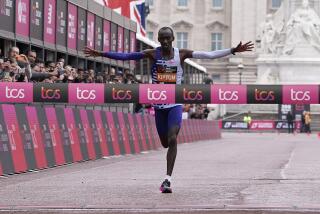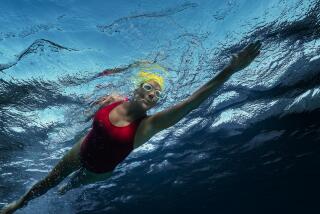Michael Phelps explains why he swam 400 IM
LONDON — After Michael Phelps concluded his record run in Beijing, he vowed never again to swim the 400-meter individual medley. The race was too grueling, he said, and he had no intention of trying to repeat his eight-for-eight gold-medal derby.
Yet there he was, swimming the event again this year, repeatedly refusing to say why.
“I’ll give you the honest answer after I’m done,” he said last week.
On his first day as a retired swimmer, he did.
He said he could not have lived with himself if he could have swum fast enough to win the gold medal in London. When Ryan Lochte won the 400 IM at the 2011 world championships in Shanghai, in 4 minutes 7.13 seconds, Phelps thought he could do better.
“After seeing the results from Shanghai last year, I thought I could swim a faster time,” Phelps said Sunday. “Clearly, I was wrong. I took a shot. I wanted to swim that race again.”
Lochte won the race at the Olympic trials in 4:07.06, with Phelps second at 4:07.89.
In London, Lochte won in 4:05.18, more than three seconds faster than anyone else in the field. Phelps finished fourth in 4:09.28, the only one of his seven events in which he did not medal.
“If I knew Ryan would swim a 4:05 . . . I knew I couldn’t go that fast,” Phelps said. “I hadn’t prepared myself to go 4:05. He swam that race perfectly.”
Phelps concluded his Olympic career with 22 medals, 18 of them gold, both records. He said he was proudest of his first medal — gold in the 400 IM at Athens in 2004 — and most regretted losing the 200 butterfly here. The race, in which he finished second to Chad le Clos of South Africa, marked the final defeat of Phelps’ career.
“If I could go back and swim that race again, I would love to,” he said. “No, I’m not coming back. Don’t get any ideas.”
His primary goal in London, he said, was to break the all-time record for career Olympic medals.
“Being able to be the most decorated was something we really wanted,” he said. “To be the best and to do something nobody else has ever done was something that was there.”
Phelps, 27, said he is looking forward to golf, travel and sleeping late. “There will be no more staring at that black line for four hours every day,” Phelps said. “I’m looking forward to moving on to the next chapter of my life.
“This is the first day of retirement. This is the first day of my new life.”
—Bill Shaikin
Full stop for Bolt
The much-hyped 100-meter showdown between Usain Bolt and Yohan Blake had been talked about for days as one of those can’t-miss Olympic moments. So the moderator for news conferences at Earls Court, this city’s venerable volleyball venue, didn’t.
“Coach Motta, I think everybody wants to watch the 100-meter final,” said Andreas Argyropoulos, talking to Turkey women’s volleyball Coach Marco Aurelio Motta.
“If you don’t mind, I’m even going to turn the sound on if that’s not unprofessional.”
And so Argyropoulos did. And there he, Motta and U.S. women’s volleyball coach Hugh McCutcheon sat on the dais, watching the TV with the reporters below. For 9.63 seconds, Team USA’s victory over Turkey didn’t matter.
The two coaches sat there, transfixed, like the rest of the Olympic following. And just like Argyropoulos too.
—K.C. Johnson
Canada calling
Guy Baker, who coached the U.S. women to three Olympic medals and two world championships in water polo, is taking his talent to Montreal. He will be coaching the Canadian women’s water polo team, and the Toronto Globe and Mail reported he has agreed to a four-year contract.
“Timing is everything,” Baker said in a news conference here Sunday. “That, for me, is the position, the job, the right job. In the right place. I have been very impressed with Water Polo Canada, and the leadership of the organization and the plan that they have for the national team. “
—Lisa Dillman
More to Read
Go beyond the scoreboard
Get the latest on L.A.'s teams in the daily Sports Report newsletter.
You may occasionally receive promotional content from the Los Angeles Times.






